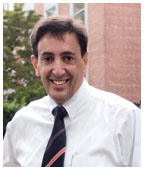
|
March 7, 2007: From the Editor
Bob Monsour
|
Bob Monsour has an unusual résumé for a Princeton administrator: Angel investor. Philanthropist. Technology entrepreneur — co-founder of a high-tech company that won a patent battle with Microsoft.
These days, Monsour works to expand relations between Princeton and industry, a prime goal of the Center for Innovation in Engineering Education, and helps to build strong, tangible connections between students and high-tech innovators. For example, the center has created a new internship program called “Preparing to Lead,” which will allow engineering students to work directly with executives in companies ranging from a software startup to IBM.
Though the center — created in 2005 and led by director Sharad Malik, the George Van Ness Lothrop Professor of Engineering — is based in the School of Engineering and Applied Science, its programs are meant for non-engineers as well, on the assumption that no one can succeed in today’s economy without a basic knowledge of technology.
The center has created and strengthened courses that aim to show how economic and cultural forces are shaped by technology: Spring offerings include one class called “Great Inventions that Changed the World,” and another on patent law and innovation policy, for example. “As students in the Woodrow Wilson School go on to develop policy in both government and industry, we feel it is important that they have a solid understanding of the technology that so pervades our lives and our society,” Monsour explains. “These students will be in a better position to understand the impact of policy decisions when there are technological issues at hand.”
In late February, the center hosted an “innovation forum” to highlight the developments and products that soon might spring from the laboratories of Princeton scientists. Among the scheduled presenters were one team that is working on quantum-cascade lasers that could have applications in medicine, security, and other fields; another team that has developed a content-distribution network that can handle very large data files; and a professor who is working on a new way to screen compounds that could yield treatments for Alzheimer’s disease.
This year, the center kicked off a new lecture series with a talk by Norman Augustine ’57 *59, a retired chairman and CEO of Lockheed Martin Corp. and a former undersecretary of the Army. Augustine also writes an essay in this issue of PAW, which centers on economics and technology. In his essay, Augustine stresses the technological demands of today’s global economy and writes about what the United States must do to remain competitive in that environment — beginning with an overhaul of public education. An interview with another technology leader, Frank Moss ’71, who heads MIT’s famed Media Lab, is on page 80.
We also present a completely unscientific look at 10 alumni with jobs
we envy, including some that are decidedly non-technical. Each alum offers
tips on his or her area of expertise, from how to choose a wine, to whether
you have what it takes to juggle. How did we choose the jobs? Interest
and fun were factors; pay was not. ![]()
![]()
Marilyn H. Marks *86
mmarks@princeton.edu

